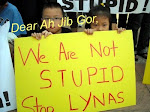August 29, 2009
MACC gets wildlife memos
By YENG AI CHUN
Star
KUALA LUMPUR: A group of animal rights activists has submitted documents to the Malaysian Anti-Corruption Commission to back their allegations against the Wildlife and National Parks Department (Perhilitan).
The documents allegedly show Perhilitan deputy director-general Misliah Mohamad Basir endorsing the renewal of special permits for convicted wildlife trafficker Anson Wong.
The endorsement later led to the approval of the special permits by the Natural Resources and Environment Ministry.
Malaysian Animal Rights Society president N. Surendran said the documents were dated 1998 to 2003 and were correspondence between Misliah, who was the then Penang Perhilitan director-general, with the head office in Kuala Lumpur.
“During that time, Wong was in prison in the United States for wildlife smuggling. How can the permits be renewed for a man who is in jail for wildlife smuggling?” asked Surendran as he showed the letters bearing Misliah’s signature to reporters.
“We believe the special permits were used as a cover to facilitate wildlife smuggling all over the world. It is embarrassing that Malaysia is helping Wong with his smuggling activities.”
He showed reporters a letter dated March 24, 1998 in which the ministry approved Wong’s request to have a tiger shipped to Higashi Tsukuba Utopia Zoological Garden in Japan.
The group checked and could not find any information on the zoo, and yet Wong now had permits from Perhilitan to keep two tigers.
Surendran called on the ministry to abolish the special permits.
Pet Positive president and PJ councillor Anthony Siva Balan Thanasayan demanded that Misliah be sacked to restore confidence in Perhilitan.
On Aug 14, the group filed reports with the commission, urging it to probe allegations of Perhilitan’s link with Wong made by author Bryan Christy in his book The Lizard King.
On the same day, Misliah dismissed the group’s claims.
She said the signatures on the documents were forged and that Wong had complied with local laws and had the necessary licences.
The others who accompanied Surendran and Anthony were Malaysia Animal Welfare Society president Shenaaz Khan, SPCA Selangor chairman Christine Chin, Independent Living and Training Centre president Francis Siva and two MPs – S. Manikavasagam (Kapar) and M. Manogaran (Teluk Intan).
MACC gets wildlife memos
By YENG AI CHUN
Star
KUALA LUMPUR: A group of animal rights activists has submitted documents to the Malaysian Anti-Corruption Commission to back their allegations against the Wildlife and National Parks Department (Perhilitan).
The documents allegedly show Perhilitan deputy director-general Misliah Mohamad Basir endorsing the renewal of special permits for convicted wildlife trafficker Anson Wong.
The endorsement later led to the approval of the special permits by the Natural Resources and Environment Ministry.
Malaysian Animal Rights Society president N. Surendran said the documents were dated 1998 to 2003 and were correspondence between Misliah, who was the then Penang Perhilitan director-general, with the head office in Kuala Lumpur.
“During that time, Wong was in prison in the United States for wildlife smuggling. How can the permits be renewed for a man who is in jail for wildlife smuggling?” asked Surendran as he showed the letters bearing Misliah’s signature to reporters.
“We believe the special permits were used as a cover to facilitate wildlife smuggling all over the world. It is embarrassing that Malaysia is helping Wong with his smuggling activities.”
He showed reporters a letter dated March 24, 1998 in which the ministry approved Wong’s request to have a tiger shipped to Higashi Tsukuba Utopia Zoological Garden in Japan.
The group checked and could not find any information on the zoo, and yet Wong now had permits from Perhilitan to keep two tigers.
Surendran called on the ministry to abolish the special permits.
Pet Positive president and PJ councillor Anthony Siva Balan Thanasayan demanded that Misliah be sacked to restore confidence in Perhilitan.
On Aug 14, the group filed reports with the commission, urging it to probe allegations of Perhilitan’s link with Wong made by author Bryan Christy in his book The Lizard King.
On the same day, Misliah dismissed the group’s claims.
She said the signatures on the documents were forged and that Wong had complied with local laws and had the necessary licences.
The others who accompanied Surendran and Anthony were Malaysia Animal Welfare Society president Shenaaz Khan, SPCA Selangor chairman Christine Chin, Independent Living and Training Centre president Francis Siva and two MPs – S. Manikavasagam (Kapar) and M. Manogaran (Teluk Intan).
* Pagar Makan Padi = Fence to protect instead destroy the paddy



